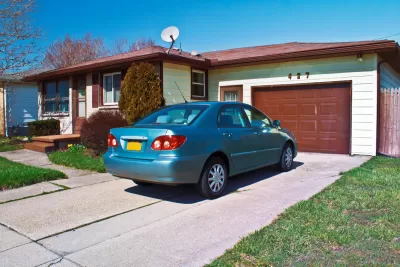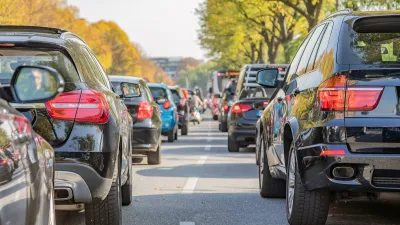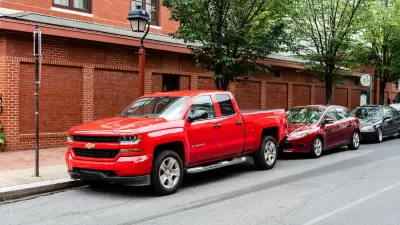How lower-income consumers are being priced out of accessible options.

Looking at recent trends in vehicle prices, Addison Del Mastro, in an article for Discourse, writes that “Much like the starter home, the starter car is on its way out.”
Del Mastro argues that “car prices are not just being driven up by scarcity, labor issues or other economic disruptions. They’re also escalating because of the removal of smaller—and less profitable—cars from manufacturers’ product lines.” In other words, Americans have less and less access to small, efficient cars, even if they want them. “For example, the Chevrolet Sonic and the Toyota Yaris were discontinued in 2020; the Hyundai Accent was discontinued in 2022; the Ford Fiesta, and now the Mitsubishi Mirage, have been discontinued in 2023.”
Comparing this decrease in access to small, affordable cars to the same phenomenon in the housing market, where affordable ‘starter homes’ are now nearly extinct, Del Mastro writes that “There’s no single explanation for this. Is it corporate greed or the unforeseen consequences of regulation? Maybe both.”
In the case of housing, zoning and other regulations have effectively criminalized some of the most affordable forms of housing such as apartments above businesses or accessory dwelling units (ADUs). “This is not exactly analogous to the starter car, but the result is the same. Automakers make more money selling larger cars, and regulations—safety regulations, but particularly the loophole by which SUVs escape higher fuel efficiency standards—skew the incentives even further toward large cars.”
While living in a walkable city with an excellent transit system may be a goal for many people, current conditions mean some people still need to drive. “[L]ife is hard, and there’s no reason for red tape and poorly crafted regulations to make it harder.” In Del Mastro’s opinion, “‘Deregulation’ is a dry and unsatisfying way of putting the answer, but it is nonetheless true that if we made it easier to deliver these bottom-rung products to market—by reforming zoning, for instance, or closing the SUV fuel-efficiency loophole—more people would do just that.”
FULL STORY: ‘Starter Cars’ Go the Way of Starter Homes

Maui's Vacation Rental Debate Turns Ugly
Verbal attacks, misinformation campaigns and fistfights plague a high-stakes debate to convert thousands of vacation rentals into long-term housing.

Planetizen Federal Action Tracker
A weekly monitor of how Trump’s orders and actions are impacting planners and planning in America.

In Urban Planning, AI Prompting Could be the New Design Thinking
Creativity has long been key to great urban design. What if we see AI as our new creative partner?

Chicago’s Ghost Rails
Just beneath the surface of the modern city lie the remnants of its expansive early 20th-century streetcar system.

Baker Creek Pavilion: Blending Nature and Architecture in Knoxville
Knoxville’s urban wilderness planning initiative unveils the "Baker Creek Pavilion" to increase the city's access to green spaces.

Pedestrian Deaths Drop, Remain Twice as High as in 2009
Fatalities declined by 4 percent in 2024, but the U.S. is still nowhere close to ‘Vision Zero.’
Urban Design for Planners 1: Software Tools
This six-course series explores essential urban design concepts using open source software and equips planners with the tools they need to participate fully in the urban design process.
Planning for Universal Design
Learn the tools for implementing Universal Design in planning regulations.
planning NEXT
Appalachian Highlands Housing Partners
Mpact (founded as Rail~Volution)
City of Camden Redevelopment Agency
City of Astoria
City of Portland
City of Laramie





























